THE DUTY OF NATIONAL HUMILITY.
[To THE EDITOR OF THE " SPICTATOR."1 Sin,—Your interesting articles on "The British Flag" and "The Tone of Empire," in the Spectator of June 10th and July 15th, impel me, with your permission, to remind your readers of the other side. I do not deny the "decline of the ruling sentiment," but I see in this the growth of the democratic conscience and intelligence. ' There is scarcely a tyranny in all history which could not be justified by the "mission to govern" theory, and every arbitrary Government has resorted to it. Yet it cannot be an excuse unless, as Carlyle taught (though he was unwilling to admit it), might is right. The races in whose territories we encamp on these missions must sometimes reject our view of the matter. Undoubtedly we try now, under stricter, democratic rule at home, to govern well abroad. But there are circumstances, under which it is better for races to work out their own political salvation, to learn through blunders, and to be free from foreign interference. Nor is it easy to see why we are under any obligation to make ourselves responsible for the government of the world, or how we can justify knocking weaker races on the head in khe name of civilisation. It were better to clear our own minds of cant and say, 'Our population grows rapidly and we need fresh fields for exploitation, and so we shall occupy your territory. We will govern you better than you have been governed, but, whether you like it or not, we, who are stronger, mean to rule over you.'
When we talk of our mission to rule we are apt to forget that our Colonies were founded chiefly for commerce, and that, splendid as they were, our wars of the eighteenth century were—prior to the French Revolution—simply bloodshed and debt to gain territory or markets. There is surely nothing heroic or even unselfish in thus extending our dominion. The ancient Romans did no worse, and theirs was a real empire, not a number of other self-interested States bent on self- government and on taxing out the produce of the mother- country. There is also the question whether the nation— who "dwell in the cottage "—gain or lose by a vast territory. We throw open the markets of India to the world ; and, whilst we pay for their naval defence, we allow Canada, Australia, and the African Colonies to levy duties on our goods. If we still sell goods there, it is therefore not because trade follows the flag, but because we sell more cheaply. What- but "Pan-Britannic gimcracks" and taxation, with immense responsibility in time of war, do we gain by a nominal India has often been a cause of war, and is always a source of weakness. We are suffering for the sins of our ancestors. We must of course accept the historical responsi- bilities, although born of commercial greed and military ambition. For us, as for Rome, it is also difficult to stop. But we shall abstain from further increase of territory as we give up Jingoism, and learn that "our country, right or wrong," is not an ethical rule. We have to remember how and why our " Empire " was 'built up, and what it means and involves. But let us reject final causes and mission theories ; then we may correct our history by our morality, instead of basing our morality on our history. It is because we begin to do this, that we are averse to " empiring " it through the world, and shall, I hope, respect the rights of weaker races. We can wish nothing better for our country than that it may adopt some higher standard of national greatness than the vulgar test of square miles. In the beat sense, a smaller England might even be greater. This is a hard saying and unpopular, but it ought to be said.—I am, Sir, Sze., G. W.
[Is national humility a duty, where national self-confidence is justified by the broadest facts P It is often a shrinking from duty, and the signal of decrepitude.—En. Spectator]



































 Previous page
Previous page